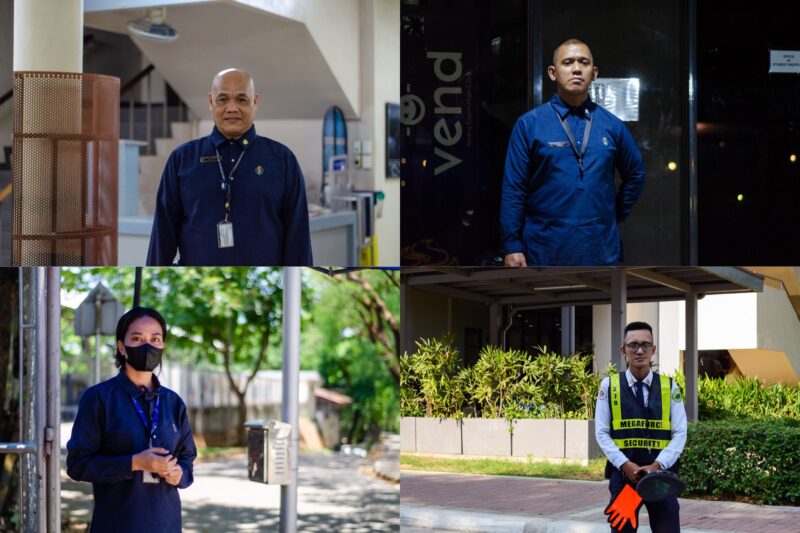Enrique Tan (II AB Eu) remembers his first Holy Communion very well. His other third grade classmates lined up by the church aisles while reciting mental prayers before receiving the sacrament. Enrique, however, had questions—and not prayers—in his mind.
“I realized that I was only receiving [the Holy Communion] because we were required to do so,” he says. “[Catholicism] just did not make enough sense to me.” Memories of his first communion marked the start of his battle with his faith, soon lost after years of frustration, trying to understand the purpose behind his beliefs. Enrique then chose to become an atheist.
Daniel* (II BS Bio) remembers his childhood Sundays as times of uncertainty and doubt. Born to a Catholic family, he began to question his beliefs at a young age. “I guess I have always been an atheist, in a sense that I never really believed in the Church sincerely,” he says. Daniel says being pushed blindly to believe in Catholicism led him farther from faith and closer to non-belief.
Born to a Taoist father and a Catholic mother, English Lecturer Elbert Or (AB IS ’04) claims to have faith but no religion. “[My lack of a religion] was less a case of deciding to stop affiliating myself with Catholicism, and more of a case of just growing up exposed to different ideas,” he says.
Yet a lack of faith or religious affiliation does not make these individuals exempt from taking the Ateneo’s theology courses.
Holy orders
“[Knowing that I had to take theology courses] did not change the fact that Ateneo is the best school in the country,” says Enrique. He chose to study in a Catholic university despite being an atheist.
The Ateneo’s core curriculum requires its students to take four theology courses, totaling 12 academic units.
“It is not unexpected to have students who come from different religious traditions as well students who are professed agnostics, atheists, and faith-seekers [in my classes],” says Theology Lecturer Fr. Randolf Flores, SVD. He says that during the screening of college freshman applicants—though the university is Catholic and Jesuit—academic freedom and equal opportunity in education for qualified students are valued more than political and religious beliefs.
Theology Lecturer Josemaria Roberto Reyes says that he has no problems with an atheist studying in the Ateneo. “I do, however, have a problem with students who blatantly disrespect theology. And that applies equally to everyone, regardless of religious affiliation,” he says.
Or says that upon deciding to study in a Jesuit-run school, one has to accept that it comes with certain conditions, such as theology courses. “I think that no one’s ever [forced] to convert to Catholicism just because they’re studying its theology,” he says. “If you’re persuaded by their ideas and teachings, sure, go ahead. Otherwise, you can stick to your own religion or belief system.”
Daniel, who will take his first Theology next semester, says he knows how to deal with the university’s theology program. While it is a requirement, he says that he is going to treat it like any other course like literature or history. “Who knows? It might give me a better perspective [of Catholicism],” he says.
After all, according to Reyes, while a student may not believe in God—and consequently in theology—it does not mean that he is excused from respecting and passing the course.
A faithless understanding
With atheists studying theology, a conflict arises when one considers St. Anselm of Canterbury’s well-known definition of theology as fides quaerens intellectum or faith seeking understanding.
Enrique, for example, believes that faith is not necessarily a requirement for passing the theology courses. “All you have to do is learn the material, you do not necessarily have to believe in [what is being taught],” he says. “The only thing lack of faith will impair you from is internalizing the material. Theology does not [need to] become a part of you.”
Or did well in his theology courses. He believes that his non-Catholicism actually helped him get high grades in theology. “Sometimes I think it is even a bigger advantage that you are coming from the outside, looking in,” he says. “It gives you a broader perspective of things, and really gets you to question ideas that others—those who grew up immersed in the religion—might take for granted.”
Reyes, meanwhile, says that grades are a measure of academic performance, not religious affiliation. He has had an experience with a student who claimed to be against God’s existence, but Reyes did not treat him any differently because of his religious background.
Flores agrees. He asks, “What are our criteria to determine that a student has fully theologized? [Is it his or her] final grade?”
Moreover, Flores explains that Anselm’s definition of theology is an 11th century definition in the context of a monolithic understanding of Christianity in the West. “The study of theology has evolved certainly since the Middle Ages and certainly with more contextual, if not better, definitions of theology.”
An absolution
Enrique has almost finished a semester of studying theology, but his beliefs (or lack thereof) have stayed the same. While theology has introduced a new way of thinking for him, he says the course does not go beyond the textbooks, the scriptural readings, and the classes. “If anything, [theology] just strengthened my atheism,” he says.
“There is a beauty to the way religion expresses certain ideas, a poetry that I was only able to appreciate after taking the classes,” says Or. He says that theology gave him a better understanding of the ideas and principles behind Catholicism. He does not regret taking four theology courses since he liked learning about new things and beliefs.
Without faith or religious affiliation, an atheist like Daniel relies on faith in things other than God. “I have faith in other things, like compassion for others and human integrity,” says Daniel. For him, one does not necessarily need to believe in God to be spiritually at peace.
When asked if the study of theology can go as far as change an atheist’s beliefs, Flores says, “By no means is theology an apology or an exposition of dogmas. Theology is not meant to [convert non-Catholic students] in the [context] of an academic course.”
To this Reyes says, “At most, the theology program can help an atheist reflect critically on his or her beliefs. As for instilling faith, that power rests on God alone.”
Editor’s note: Theology Lecturer Josemaria Roberto Reyes asked for The GUIDON to state clearly that his insights and opinions expressed herein are his own and are neither those of the Ateneo nor of the Theology Department.
*Name has been changed to protect the individual.






